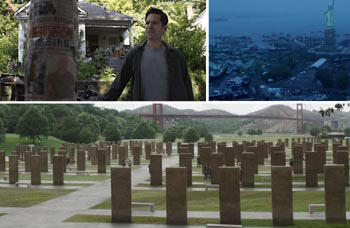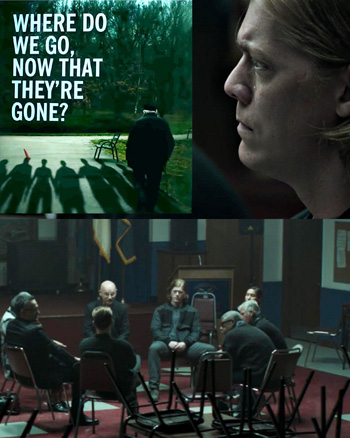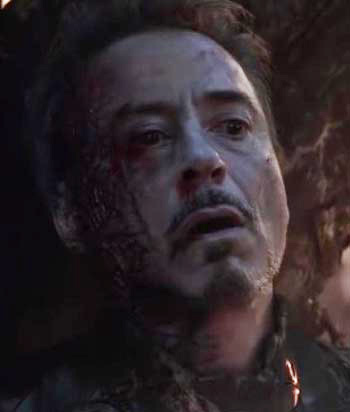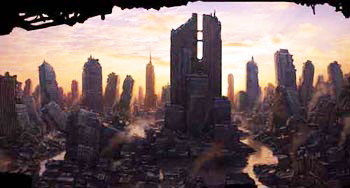Movie Review
 |
 |
 |
 |
 |
 |
 |
The Marvel Universe – V
A World Where Suffering & Merit
Have No Meaning
Elizabeth A. Lozowski
The Avengers failed in their mission, or so it would seem. Half of the population of the universe has vanished into dust. Many of their families and friends are gone, and those who remain have lost hope. This is the outset of Avengers: Endgame, a film where modern man’s lack of nobility and pervading sense of despair is accurately portrayed.
Pathetic modern man cannot rise above a crisis
In the beginning of Endgame, the Avengers find Thanos on a peaceful planet and learn that he has destroyed all of the infinity stones needed to bring back the population that vanished into dust. In an angry rage, Thor kills Thanos, but there is nothing to be done to bring back the vanished ones.
 So the Avengers all return to normal life, trying to resolve their problems and move on. But in reality, most of them cannot do so.
So the Avengers all return to normal life, trying to resolve their problems and move on. But in reality, most of them cannot do so.
Five years pass and the world still looks as wretched as when half of the population disappeared. It is pathetic. Most of the houses are in ruins and those that remain are disordered and unkempt. No one seems to have the motivation to rebuild.
The only thing that they have the energy to build is a modernist monument to the “vanished” – long, cold lines of drab rectangular stones. Instead of moving forward to rebuild with determination and resolution, they sit around moping and mourning their losses.
One of the first scenes in the movie shows Captain America giving a “pep” talk to a small group of depressed persons – most of them men. A poster in the foreground reads “Where do we go, now that they’re gone?”
One of the men tells his story about how he went on a date – with a man – and they both broke down crying.
My first reaction was shock to have the first explicit reference to homosexuality in a Marvel movie, and to see such a relationship condoned by the most conservative Avenger is even more appalling. It seems there is an order from the revolutionary powers-that-be for every popular movie to have its LGBT appearance. Even the most recent Star Wars movie, The Rise of Skywalker, shows two women kissing in the last scene.
My second reaction was abhorrence at how effeminate and miserable the people are, without the will to do anything or the means to accept suffering.
 At first, one may think that the bleak situation presented in Endgame is improbable: if a great crisis were really to occur, surely people would not be so pathetic. However, considering the weakness and lack of faith of modern man, this could very well be an accurate portrayal of how he would react to such a crisis.
At first, one may think that the bleak situation presented in Endgame is improbable: if a great crisis were really to occur, surely people would not be so pathetic. However, considering the weakness and lack of faith of modern man, this could very well be an accurate portrayal of how he would react to such a crisis.
All that modern man has in life is his relationships with others. Without these persons to comfort him, he is lost. Should they die or leave him, he no longer knows the meaning of life. God is no solace to him, for he has chosen the passing pleasures of the world over the joys of eternity.
The Avengers wallow in their own self-pity for this very reason: they have no higher ideals for which to live or die but the relationships they form with humanity.
On the contrary, a Catholic faces crises as a means to detach himself from the world and to save his soul. Based on his faith, he knows that suffering builds virtue. He, being free of disordered attachments, does not give into despair when he loses that which is dear to him. The Revolution despises both virtue and the noble spirit, so the role models it presents for the public can see no farther than the things of this world.
Death reveals the meaninglessness of life
The nobility of a person can be determined in many ways by how he faces death. In the Marvel Universe death signifies defeat and is not well accepted, even if a superhero dies for the sake of humanity. As the Avengers approach death, they remain vulgar, earthly-minded and selfish, as is especially evident in Iron Man.
In the opening scene of Endgame, Iron Man is trying to send a message to his wife on Earth from a spaceship that has lost power and is drifting into outer space. Instead of nobly accepting his fate and sending his wife heroic words of encouragement, he tells her:
“You know, if it wasn’t for the existential terror of staring in the literal void of space, I’d say I feel much better today. … Oxygen will run out tomorrow morning. And that’ll be it. . . Don’t feel bad about this. I mean, actually, if you grovel for a couple of weeks, then move on with enormous guilt… Please know, when I drift off, it will be like every night lately. I’m fine. Totally fine. I will dream about you. It’s always you.”
 These few lines sum up the major problems of the Marvel movies: a lack of seriousness about life and death, disordered attachments to the world, and no supernatural virtue. Even what appears to be love is really just self-love, loving only the pleasure that one can receive from others.
These few lines sum up the major problems of the Marvel movies: a lack of seriousness about life and death, disordered attachments to the world, and no supernatural virtue. Even what appears to be love is really just self-love, loving only the pleasure that one can receive from others.
This time Iron Man is saved and returns to Earth; however, when Iron Man finally does die at the end of the movie after sacrificing his life to defeat Thanos, his eyes reveal emptiness and despair. Even though he dies a hero, death strips him of any dignity or hope. This is the depressing reality of the modern hero: he has no true virtues and, as a result, dies for nothing.
All of the superheroes, in spite of their powers and dedication to mankind, lack what is needed to conquer their disorderly passions and die peacefully with the hope of an eternal reward. They are self-absorbed, not willing to give up anything, nor willing to suffer because they do not understand either its meaning or its value in life.
An evil God and the Chastisement
The Avengers eventually find a way to travel back in time and collect all of the Infinity Stones, thus being able to create another Infinity Gauntlet that brings back those who had vanished. Thanos, from the past, is able to travel to the future, following the Avengers in their space travel to thwart their mission. The final battle between the Avengers and Thanos thus commences.
In this encounter, Thanos states, "You could not live with your own failure. And where did that bring you? Back to me. I thought by eliminating half of life, the other half would thrive, but you've shown me... that's impossible. As long as there are those that remember what was, there will always be those that are unable to accept what can be. They will resist... I'm thankful... because now... I know what I must do. I will shred this universe down to its last atom and then, with the stones you've collected for me, create a new one teeming with life that knows not what it has lost but only what it has been given. A grateful universe."
This speech reveals a kind of god-like Thanos, who takes on the role of creator and destroyer. Though not God as we know Him, Thanos embodies some similar attributes.
He is the one who must correct the universe and, as he often says, "has the will" to do it. He sacrifices the thing he loves most - his own daughter - to gain the “salvation” of the universe. He is the only one willing to make this sacrifice and strong enough to wield all of the power in the universe, making him “inevitable," as he boasts at the end of the film.
Even the creators of the film do not deny the reference. In one of the “making of the film” videos for Avengers: Infinity War, one director says that Thanos is like God. This interview made me realize one of the most dangerous underlying goals of these two Avengers films: to encourage rebellion against God.
 In many ways, the genocide of half of the population in the Marvel Universe could be compared to the coming Chastisement, predicted by Our Lady of Fatima. This chastisement will end in the death of much of humanity, perhaps half or more. Every person will have to choose whether he will accept or reject the punishment, to the detriment of his soul. Those who love God will be thankful that the Hand of Justice is cleansing the evil and blasphemous world, preparing the way for the Triumph of the Immaculate Heart.
In many ways, the genocide of half of the population in the Marvel Universe could be compared to the coming Chastisement, predicted by Our Lady of Fatima. This chastisement will end in the death of much of humanity, perhaps half or more. Every person will have to choose whether he will accept or reject the punishment, to the detriment of his soul. Those who love God will be thankful that the Hand of Justice is cleansing the evil and blasphemous world, preparing the way for the Triumph of the Immaculate Heart.
The Devil, who knows that there is no way to prevent the Chastisement, is doing his best to encourage people to revolt against God’s judgment when it comes. For this reason, the Devil turns to one of his best instruments of destruction – Hollywood films.
It is very clear that the message of Infinity War and Endgame is that a god who would destroy half of humanity is evil and that he should be resisted. The Avengers do not accept the “chastisement” or the suffering. Instead, they hate the one who causes the death and destruction and, in their defiance of God, they are victorious.
Yet, the Avengers movies are not the only movies that feature heroes fighting against a villain-god who wants to destroy much of mankind in the name of justice. Dark Knight Rises also comes to mind, where Batman fights against a villain who wishes to destroy Gotham because it is full of corruption.
Indeed, many modern movies encourage people to defy anyone, be he human or god, who dares to chastise a sinful world. No matter how bad humankind is portrayed, Hollywood advocates its right to live.
Though mankind can never be victorious in holding back the hand of God, as the Avengers do, they can lose their souls. Those who blaspheme God and blame Him for the suffering of the Chastisement will be damned. The Devil is forming the mentality of modern man, through modern movies, so that when the Chastisement comes, many souls will be cast into Hell for despising God’s justice.
Continued

Pathetic modern man cannot rise above a crisis
In the beginning of Endgame, the Avengers find Thanos on a peaceful planet and learn that he has destroyed all of the infinity stones needed to bring back the population that vanished into dust. In an angry rage, Thor kills Thanos, but there is nothing to be done to bring back the vanished ones.

The city in ruin; the monuments to the vanished
Five years pass and the world still looks as wretched as when half of the population disappeared. It is pathetic. Most of the houses are in ruins and those that remain are disordered and unkempt. No one seems to have the motivation to rebuild.
The only thing that they have the energy to build is a modernist monument to the “vanished” – long, cold lines of drab rectangular stones. Instead of moving forward to rebuild with determination and resolution, they sit around moping and mourning their losses.
One of the first scenes in the movie shows Captain America giving a “pep” talk to a small group of depressed persons – most of them men. A poster in the foreground reads “Where do we go, now that they’re gone?”
One of the men tells his story about how he went on a date – with a man – and they both broke down crying.
My first reaction was shock to have the first explicit reference to homosexuality in a Marvel movie, and to see such a relationship condoned by the most conservative Avenger is even more appalling. It seems there is an order from the revolutionary powers-that-be for every popular movie to have its LGBT appearance. Even the most recent Star Wars movie, The Rise of Skywalker, shows two women kissing in the last scene.
My second reaction was abhorrence at how effeminate and miserable the people are, without the will to do anything or the means to accept suffering.

People mourning their losses
All that modern man has in life is his relationships with others. Without these persons to comfort him, he is lost. Should they die or leave him, he no longer knows the meaning of life. God is no solace to him, for he has chosen the passing pleasures of the world over the joys of eternity.
The Avengers wallow in their own self-pity for this very reason: they have no higher ideals for which to live or die but the relationships they form with humanity.
On the contrary, a Catholic faces crises as a means to detach himself from the world and to save his soul. Based on his faith, he knows that suffering builds virtue. He, being free of disordered attachments, does not give into despair when he loses that which is dear to him. The Revolution despises both virtue and the noble spirit, so the role models it presents for the public can see no farther than the things of this world.
Death reveals the meaninglessness of life
The nobility of a person can be determined in many ways by how he faces death. In the Marvel Universe death signifies defeat and is not well accepted, even if a superhero dies for the sake of humanity. As the Avengers approach death, they remain vulgar, earthly-minded and selfish, as is especially evident in Iron Man.
In the opening scene of Endgame, Iron Man is trying to send a message to his wife on Earth from a spaceship that has lost power and is drifting into outer space. Instead of nobly accepting his fate and sending his wife heroic words of encouragement, he tells her:
“You know, if it wasn’t for the existential terror of staring in the literal void of space, I’d say I feel much better today. … Oxygen will run out tomorrow morning. And that’ll be it. . . Don’t feel bad about this. I mean, actually, if you grovel for a couple of weeks, then move on with enormous guilt… Please know, when I drift off, it will be like every night lately. I’m fine. Totally fine. I will dream about you. It’s always you.”

The Iron Man's eyes reveal emptiness and dispair
This time Iron Man is saved and returns to Earth; however, when Iron Man finally does die at the end of the movie after sacrificing his life to defeat Thanos, his eyes reveal emptiness and despair. Even though he dies a hero, death strips him of any dignity or hope. This is the depressing reality of the modern hero: he has no true virtues and, as a result, dies for nothing.
All of the superheroes, in spite of their powers and dedication to mankind, lack what is needed to conquer their disorderly passions and die peacefully with the hope of an eternal reward. They are self-absorbed, not willing to give up anything, nor willing to suffer because they do not understand either its meaning or its value in life.
An evil God and the Chastisement
The Avengers eventually find a way to travel back in time and collect all of the Infinity Stones, thus being able to create another Infinity Gauntlet that brings back those who had vanished. Thanos, from the past, is able to travel to the future, following the Avengers in their space travel to thwart their mission. The final battle between the Avengers and Thanos thus commences.
In this encounter, Thanos states, "You could not live with your own failure. And where did that bring you? Back to me. I thought by eliminating half of life, the other half would thrive, but you've shown me... that's impossible. As long as there are those that remember what was, there will always be those that are unable to accept what can be. They will resist... I'm thankful... because now... I know what I must do. I will shred this universe down to its last atom and then, with the stones you've collected for me, create a new one teeming with life that knows not what it has lost but only what it has been given. A grateful universe."
This speech reveals a kind of god-like Thanos, who takes on the role of creator and destroyer. Though not God as we know Him, Thanos embodies some similar attributes.
He is the one who must correct the universe and, as he often says, "has the will" to do it. He sacrifices the thing he loves most - his own daughter - to gain the “salvation” of the universe. He is the only one willing to make this sacrifice and strong enough to wield all of the power in the universe, making him “inevitable," as he boasts at the end of the film.
Even the creators of the film do not deny the reference. In one of the “making of the film” videos for Avengers: Infinity War, one director says that Thanos is like God. This interview made me realize one of the most dangerous underlying goals of these two Avengers films: to encourage rebellion against God.

Chastisement may result in half of humanity destroyed
The Devil, who knows that there is no way to prevent the Chastisement, is doing his best to encourage people to revolt against God’s judgment when it comes. For this reason, the Devil turns to one of his best instruments of destruction – Hollywood films.
It is very clear that the message of Infinity War and Endgame is that a god who would destroy half of humanity is evil and that he should be resisted. The Avengers do not accept the “chastisement” or the suffering. Instead, they hate the one who causes the death and destruction and, in their defiance of God, they are victorious.
Yet, the Avengers movies are not the only movies that feature heroes fighting against a villain-god who wants to destroy much of mankind in the name of justice. Dark Knight Rises also comes to mind, where Batman fights against a villain who wishes to destroy Gotham because it is full of corruption.
Indeed, many modern movies encourage people to defy anyone, be he human or god, who dares to chastise a sinful world. No matter how bad humankind is portrayed, Hollywood advocates its right to live.
Though mankind can never be victorious in holding back the hand of God, as the Avengers do, they can lose their souls. Those who blaspheme God and blame Him for the suffering of the Chastisement will be damned. The Devil is forming the mentality of modern man, through modern movies, so that when the Chastisement comes, many souls will be cast into Hell for despising God’s justice.
Continued

Posted February 7, 2020
______________________
______________________





